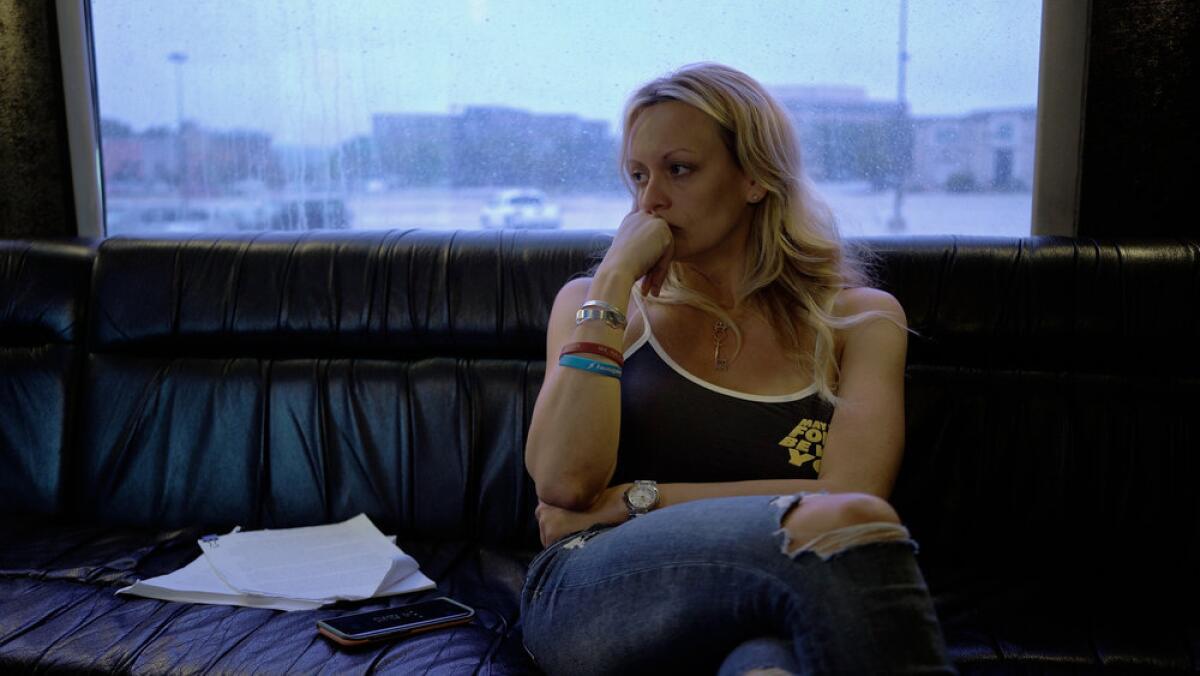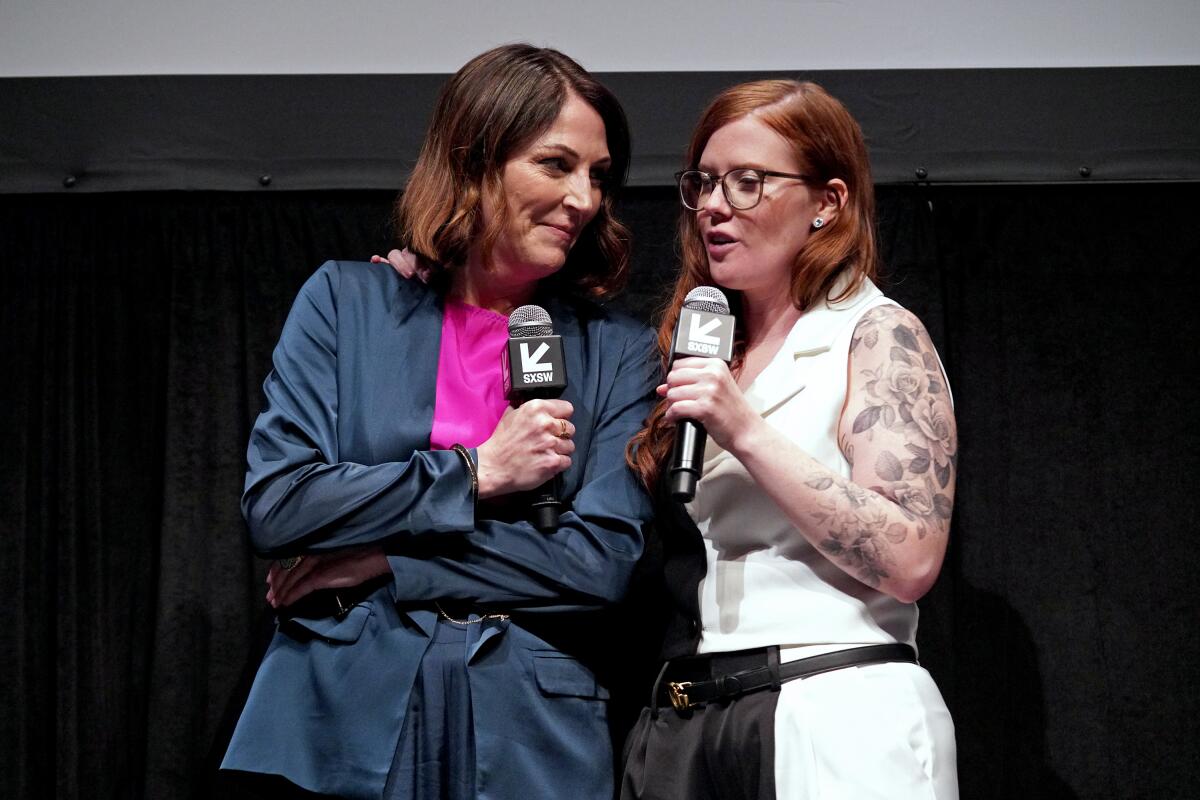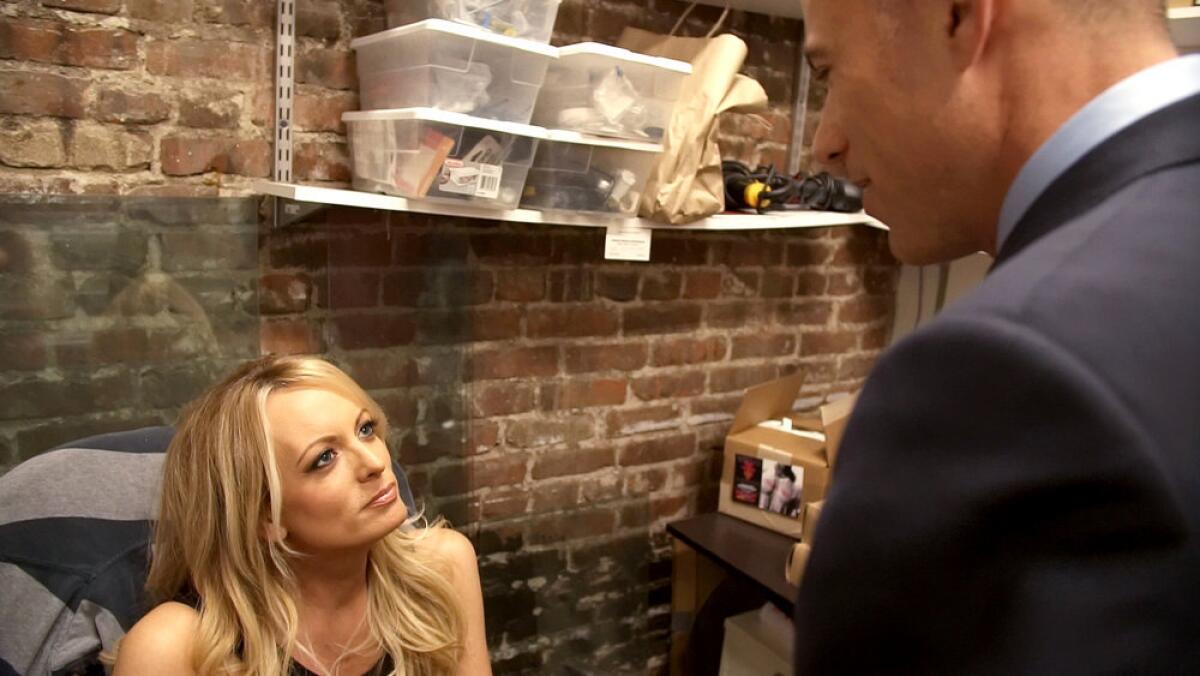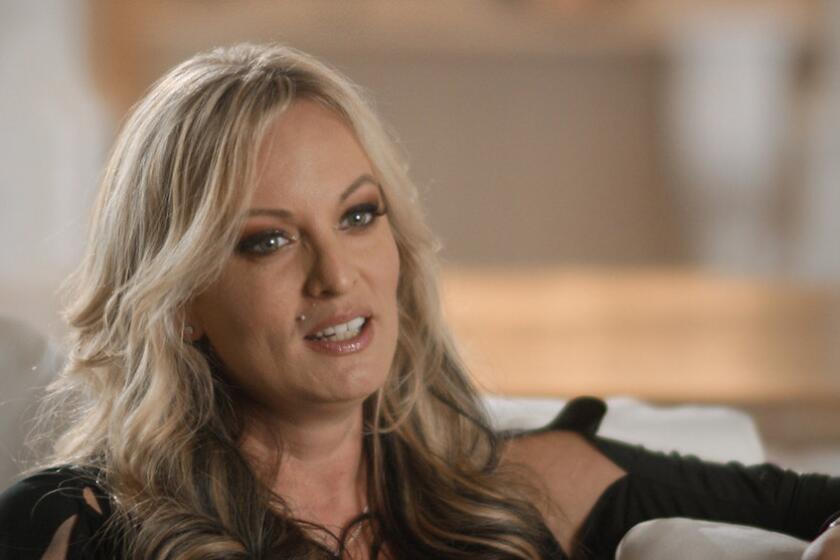‘Stormy’ filmmakers say they wanted to show how the justice system failed Daniels

Stormy Daniels has never shied away from speaking frankly about what she says transpired between her and former President Trump, but how well do you really know her?
That’s the question that the new Peacock documentary “Stormy,” now streaming, aims to answer. The film takes a closer look at Daniels’ personal life and how it’s been transformed since Michael Cohen admitted coordinating a payment to Daniels and another woman, Karen McDougal, just before the 2016 election to keep quiet about their affairs with Trump. Cohen pleaded guilty to federal charges for the hush-money payment, which led to Trump’s indictment on 34 counts of falsifying business records in 2023.
Director Sarah Gibson and producer Erin Lee Carr, previously behind the film “Britney vs Spears,” say they teamed up again for “Stormy” because they wanted to offer viewers a broader look at Daniels. They describe how the men in Daniels’ life have failed her — as has the justice system — and go into how she’s coped with online threats and attacks, multiple lawsuits, the breakup of her family and the media attention that has often reduced her to a singular description.
“Porn star Stormy Daniels — you never saw her name without ‘porn star,’” Carr says. “She was a porn star director. She was incredibly talented and is talented.”
Gibson and Carr began their project a year before Trump’s indictment in the hush-money payment was handed up by a Manhattan grand jury. They persuaded Daniels not only to speak to them but also to give them editorial control, thanks in part to Judd Apatow, whom Daniels had worked with previously, making cameos in “The 40-Year-Old Virgin” and “Knocked Up.” Apatow is an executive producer on “Stormy” (Sara Bernstein and Meredith Kaulfers from Imagine Documentaries are also EPs). Initially, the film was supposed to document how Daniels was reinventing herself, but Trump’s indictment changed everything. Gibson says they tried at first to make the documentary with private funding because no one would touch it until Peacock came along.
“Everyone was afraid of Trump and getting sued,” Gibson says. “Even when we started trying to get this made [and] out in the world, before the indictment happened, this project was scary for people who didn’t want to be engaged in years-long litigation.”
The release of the documentary comes at a notable time. Trump’s hush-money trial was originally scheduled to begin on March 25. However, on Friday, a judge agreed to a 30-day postponement after the former president’s lawyers said they needed more time to review new evidence from the U.S. attorney’s office in Manhattan.
As much as the documentary is about Daniels and the Trump indictment, it’s also about the litigation she’s faced involving her former lawyer Michael Avenatti, who was convicted of stealing book proceeds from Daniels, and a defamation lawsuit against Trump that she says Avenatti filed on her behalf without her permission, which she lost. The suit was appealed, but the 9th U.S. Circuit Court of Appeals ruled in Trump’s favor, and Daniels now owes the former president more than $600,000 in legal fees.
“We used to say this is the tale of the two Michaels,” Gibson says of Avenatti and Cohen. “Michael Cohen started out as a foe and is now a friend ... [whereas Avenatti] wouldn’t let us record the phone call in prison.”
Gibson and Carr spoke over Zoom about what it was like to document Daniels’ life, how the Fox News-related movie “Bombshell” was an inspiration and what they want audiences to take away from the film. This interview has been edited and condensed for clarity.

The documentary premiered recently at the South by Southwest festival in Austin, Texas. What was that like, and what was the reception from the audience?
Sarah Gibson: It was the first time we’ve shown it for a group of people that big. Stormy was in the audience watching it; she’d seen it before for the first time over Zoom with me [and Erin] — that was very powerful. We were so impressed that she showed up because she was quite frightened to go. She was sitting in the audience, and she got up onstage afterward, and she was very weepy and told the story about how she met Judd, how she met me [and] how grateful she was for us telling her story. She said, “You warned me this wasn’t going to be a puff piece, and it was a truth piece, and I feel like you really did my story justice.” That was the best review we could have gotten. That was the most important feedback, from a woman who has been through hell. We didn’t want this film to cause her more trauma.
Erin Lee Carr: Ultimately, we as filmmakers want [documentary subjects] to feel like they’re accurately portrayed but that we show what it’s like to be them, we show their heart [and] we show the intimacy. Stormy is among so many people that we’ve tried to put forward in an authentic way.
Why did you decide to do a documentary about Daniels? How did you initially connect with her?
Gibson: I worked with Stormy on a comedy project in 2019. … We stayed in touch after she left the set. On the way up to Canada that same day, she got stopped at the Canadian border with the 17 charges on her FBI record that were false [shown in the documentary]. She was texting me from the airport and telling me what had happened. It sounded like a conspiracy theory. After she got home, we stayed in touch about that … She was in a really dark place at the time.
When she was in court against Michael Avenatti in 2022, I was listening to [a clip about] it on NPR. I live here in L.A., pulled over on the freeway and called her and said, “Stormy, you know, Erin and I just made a film about Britney Spears and the justice system not working for her. And if you’re interested in telling your story about how the justice system has failed you, we’re here for you, just say when.” She said, “I just saw your Britney film. Let’s do it.”
Daniels has been very outspoken on both traditional and social media about what happened between her and Trump. What made it different for her to speak to you and do this documentary?
Carr: A point we make is that she was looked at as this one-dimensional character by the media. I’m a journalist, but seeing it from her perspective — which is what I tried to do every day — was intense. She has put her trust in a lot of men that failed her, and an opportunity to work with a documentarian like Sarah and myself, we were going to show up for her and we did.
A portion of your footage was captured by journalist Denver Nicks, who profiled Daniels in 2018 for Rolling Stone. How did that footage come into your hands, and why did you choose to use it?
Carr: Anytime that you can have contemporaneous footage inside a film that you’re doing, it is a literal gold mine. Stormy Daniels actually had ended up having a friendship with Denver Nicks. When we first got the project started, we said, “Is there footage of you that was happening during this time?” Denver was one of four people that gave us footage. We decided to put it in because it really showed what was happening [and] what it was like when it was happening.
Gibson: Most important, Stormy consented to us using it. We’re very grateful that we were able to capture her emotional moments as the news was unfolding, which is what the unique aspect of this film is.
The details that Daniels shares of the night that she and Trump met — they differ from the “60 Minutes” interview she gave. She says Trump cornered her. She maintains the encounter was consensual, but it felt like she was processing and reevaluating that night differently. Do you think that is the case? What was it like to hear her reflect on that moment?
Gibson: It was really powerful. She had actually said in the interview that when she saw the movie “Bombshell” — which was a big inspiration behind this film for me personally and … I had already thought of her story a lot in that “Bombshell” kind of world — she said, “You know, when I saw the movie ‘Bombshell,’ I realized what had happened to me all these years later. I realized it was a casting-couch situation. It was a situation where I didn’t have any power. And because of my past trauma, I left my body.” It is true that trauma survivors process things over time, they become more and more conscious of what happens in their life. I think that happened for Stormy.
‘I have not forgiven myself because I didn’t shut his a— down in that moment’ in 2006, the adult filmmaker says in ‘Stormy,’ premiering March 18 on Peacock.
You spoke with a lot of people — Apatow, Jimmy Kimmel, Daniels’ former and current husband, her childhood friend Travis Partin — the list goes on. In speaking with Daniels’ family and friends, what would you say they think about everything that’s transpired? How do they feel it’s affected her personally?
Gibson: She’s had some of the darkest times in her life since the news broke. She’s in constant fight or flight, she’s concerned about her daughter being seen with her in public — she’s in college. She’s a woman living in fear but tries so hard to not let it break her. Her friends are worried … she’s going to lose her home because of the legal fees she owes Trump’s attorneys. This is a woman who fought so hard and worked so hard to build a career that was just gone in a moment. She’s still the main breadwinner in her family, she’s still been able to continue to be the provider for her former husband and child.
Carr: In the film, we see Joy [King], one of the former executives of Wicked [Pictures, the adult-film studio], and she wasn’t really worried about Stormy until now. We talk a lot about the death threats in the film, but something that’s really important to us [to show] is that this is somebody who was let down by the justice system, owes Trump over $600,000 and has to stand up and testify in a court case, where the system has let her down.
We can’t end the film in a tidy pink bow, right? The takeaway from what Stormy says at the end of the film … is just: I’m tired. People in her life are tired, she’s tired. It took so much for her to stand up. … Her life has borne enormous consequences.

It’s striking how vicious the attacks have become, like when she’s reading her social-media feed and also the footage that you show from her car, where she’s being chased [by a person in another car]. How is she coping with that, now that the hush-money trial is on the horizon?
Gibson: I spoke to her [Wednesday] morning. She was talking to me … about having to be in New York for the launch of the film and all the questions she’s going to get asked and how anxious she is. Her voice was shaking. She knows now that she’s been handed this important moment in the history of our country, to really show up for it. She’s showing that same fighting spirit that we see in the film.
Nonetheless, some people still seem to have these divisive feelings about Daniels, even those who in theory are more liberal-minded about who she is and her profession. Why do you think that is?
Carr: We live in such a sex-negative culture. Anytime you’ve done sex work, in a lot of the eyes of the American public, you’re tarnished in some way… that’s insanely laughable that somebody with a profession that is as old as time is designated as nonhuman to people and [you hear her critics] saying, “Oh, you know, she’s just a person that did it for attention. She’s just looking to capitalize on the sex she had with Trump.” We’re hoping when people have a knee-jerk reaction to a woman asking for attention — when they think, “Oh, she did it for attention” — show the tweets.
What do you want audiences to take away from this documentary?
Gibson: It was about humanizing her and going through this crazy time in her life with her as an audience, and not agreeing with a lot of the choices she made, but still having great empathy for her and an awareness that this woman should not be living in fear with her daughter in this country. She has the right to feel safe. She also has the right to a fair legal process, and we really wanted to shine a light on the legal system not working for her.
Carr: We tried to create a loving, intimate portrait of Stormy, but also to show the predators that were around her. That includes people and the men in her life that have taken from her and exploited her. She says, “The only thing I’m addicted to is wanting people to love me back” … that’s what she wanted. She wanted to be loved. She wanted to be protected after an impoverished, difficult childhood. Perhaps, we think, there’s some universality to that.
Do you have any plans to keep following her as she continues to go through the legal process?
Gibson: She and I talked today about the fact that she’s documenting herself … being a filmmaker [herself], she’s so smart. She was documenting herself back in 2018 — a lot of the film is her setting up a GoPro or setting up her cellphone and filming herself. She is doing that again right now.
Carr: We won’t kiss and tell in this particular case.
More to Read
The complete guide to home viewing
Get Screen Gab for everything about the TV shows and streaming movies everyone’s talking about.
You may occasionally receive promotional content from the Los Angeles Times.








